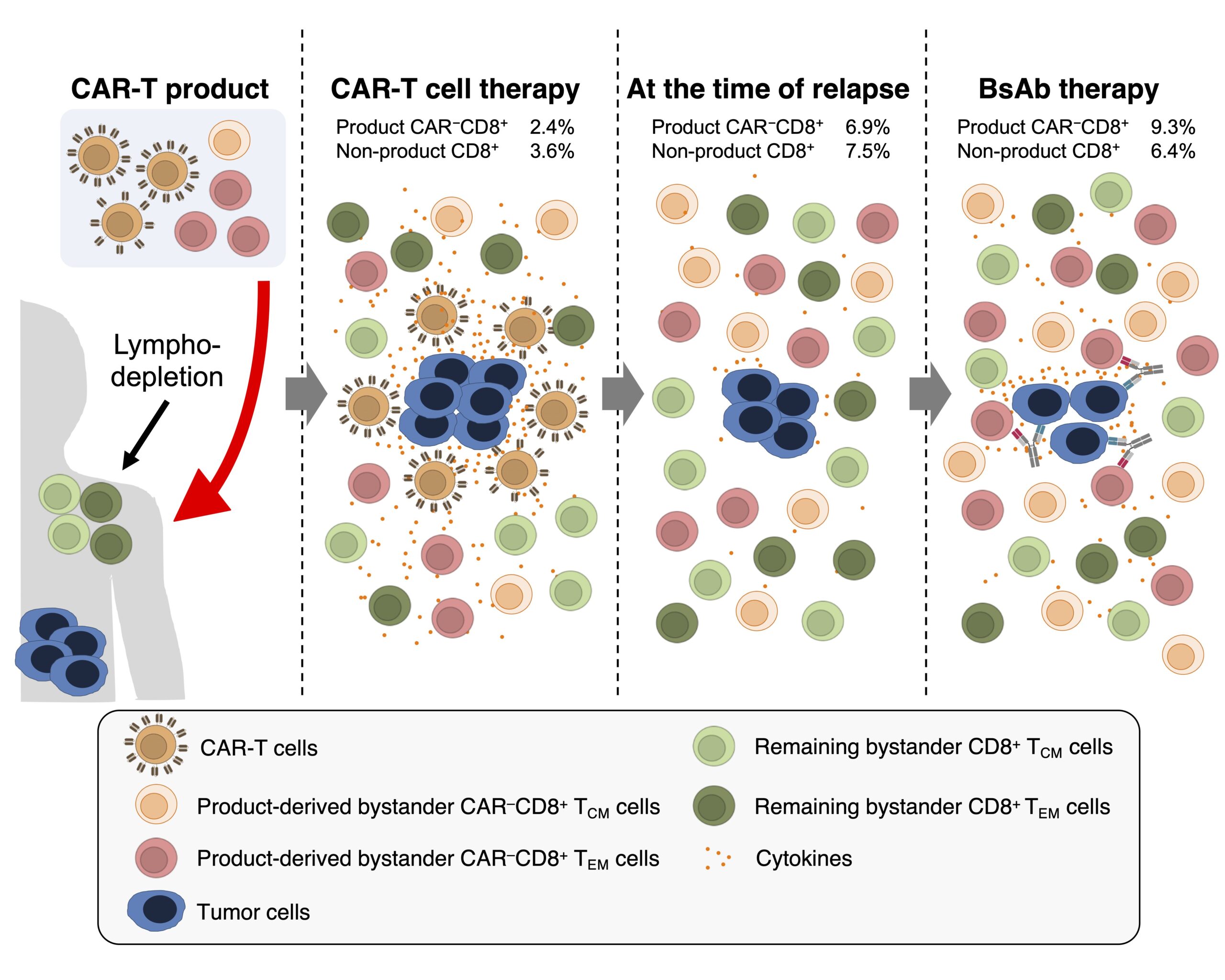Bystander T cells can enhance antitumor effects of bispecific antibody
Discovery of new therapeutic effects induced by CAR-T cell therapy
We have proposed a new therapeutic effect of CAR-T-cell therapy through a lymphoma case treated with bispecific antibody(BsAb). Memory-formed T cells had been developed in the body after CAR-T-cell therapy. Interestingly, bystander CAR-negative CD8+ T cells in the CAR-T-cell product successfully expanded in periphery and lymph node, and mostly propagated after treatment with BsAb, which resulted in complete remission. Therefore, such sequential approach using CAR-T/BsAb might have a potential to further enhance antitumor effects.
T-cell redirection therapy using chimeric antigen receptor(CAR)T cells and/or bispecific antibody(BsAb)has been established and become a promising treatment strategy for relapsed/refractory B-cell lymphomas. To further improve their therapeutic efficacy, assessment of their in vivo mechanisms and the ways of sequential approaches are necessary.
In this study, we have chronologically analyzed T-cell clones and their memory phenotypes in peripheral blood mononuclear cells(PBMCs)and lymph node cells collected at the different time points through a lymphoma case treated with CD20 x CD3 BsAb following CD19 CAR-T cell therapy. First, memory-formed T cells had successfully expanded in peripheral blood and lymph node after CAR-T cell therapy when compared with those at the timing of apheresis. Those memory T-cell population had increased more after BsAb therapy. Then, we had labelled both CD3+CD8+ T cells and CD3+CD4+ T cells collected from the apheresis product using TCR-β gene, and followed their T-cell clones. Interestingly, product-derived bystander CAR-negative CD8+ T cells had expanded after CAR-T cell therapy, infiltrated in relapsed lymph node, and further propagated after BsAb therapy, which resulted in complete remission of tumors.
Therefore, these findings might support a new therapeutic effect of bystander CAR–CD8+ T cells in a CAR-T cell product in combination with BsAb, and strengthen such sequential approaches using CAR-T and BsAb therapy.
Reference URL: https://jitc.bmj.com/content/13/6/e011690
Bibliographic Information
Bystander CAR-CD8+ T cells in a CAR-T cell product can expand and enhance the antitumor effects of a bispecific antibody.
Junichi Kato, Tatsuya Konishi, Takatsugu Honda, Masaki Maruta, Shogo Nabe, Yuya Masuda, Meika Matsumoto, Natsumi Kawasaki, Yukihiro Miyazaki, Yasukazu Doi, Yasunori Takasuka, Jun Yamanouchi, Toshiki Ochi, Katsuto Takenaka
J Immunother Cancer, 13(6), e011690,
doi: 10.1136/jitc-2025-011690, 2025(June 24).
Fundings
- Daiichi Sankyo Co.
Fundings
- Otsuka Pharmaceutical
Media
-

The roles of CAR-T product-derived bystander T cells for BsAb therapy.
A CAR-T cell product can contain both CAR-T cells and CAR-negative bystander T cells(left). After treatment with CAR-T cell therapy, CAR-T cells kill tumor cells and release a panel of cytokines. In the presence of those cytokines, simultaneously transferred product-derived bystander T cells and remaining bystander T cells in the body have an opportunity to expand and form memory T cells(middle). Especially, product-derived bystander CAR-CD8+ T cells can further proliferate after BsAb therapy, resulting in enhanced therapeutic effects against relapsed tumor cells(right).
credit : Junichi Kato,Tatsuya Konishi,Toshiki Ochi,Katsuto Takenaka,Ehime university
Usage Restriction : Please get copyright permission
Contact Person
Name : Toshiki Ochi
Phone : +81-89-960-5296
E-mail : ochi.toshiki.eg@ehime-u.ac.jp
Affiliation : Department of Hematology, Clinical Immunology and Infectious Diseases, Ehime University Graduate School of Medicine.
